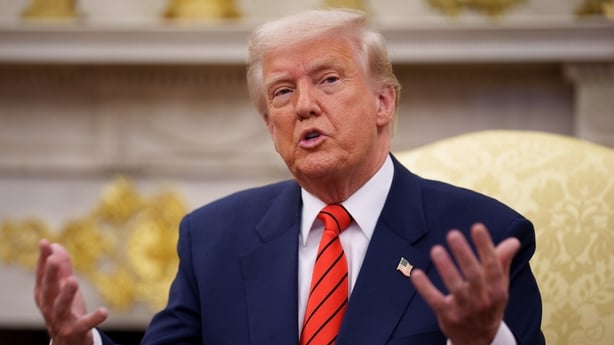US President Donald Trump has today awarded Boeing the contract to build the US Air Force's most sophisticated fighter jet, handing the company a much-needed win.
The Next Generation Air Dominance (NGAD) programme will replace Lockheed Martin's F-22 Raptor with a crewed aircraft, built to enter combat alongside drones.
The plane's design remains a closely held secret, but would likely include stealth, advanced sensors, and cutting-edge engines.
Shares of Boeing were up 5% after the news, with the Seattle-based company beating Lockheed Martin for the deal. Lockheed's shares fell nearly 6%.
Mr Trump announced the winner from the White House, saying the new jet will be called the F-47.
Much-needed win for Boeing
For Boeing, the win marks a reversal of fortune for a company that has struggled on both the commercial and defence sides of its business. It is a major boost for its St. Louis, Missouri, fighter jet production business.
The engineering and manufacturing development contract is worth more than $20 billion. The winner will eventually receive hundreds of billions of dollars in orders over the contract's multi-decade lifetime.
NGAD was conceived as a "family of systems" centred around a sixth-generation fighter to counter adversaries such as China and Russia.

Boeing's commercial operations have struggled as it attempts to get its best-selling 737 MAX jet production back up to full speed, while its defence operation has been weighed down by underperforming contracts for mid-air refuelling tankers, drones and training jets.
Cost overruns at the KC-46 mid-air refuelling tanker programme have surpassed $7bn in recent years, while another fixed-price contract to upgrade two Air Force One planes has created a $2bn loss for the top 5 US defence contractor.
Future concerns for Lockheed
Lockheed, which was recently eliminated from the competition to build the Navy's next-generation carrier-based stealth fighter, faces an uncertain future in the high-end fighter market after the loss.
Billionaire and presidential adviser Elon Musk has voiced skepticism about the effectiveness of crewed high-end fighters, saying cheaper drones were a better option.
While Lockheed could still protest the award to Boeing, the fact Trump announced the deal in a high-profile Oval Office press conference could reduce the possibility of a public airing of arguments against the agreement from the Maryland-based defence firm.

